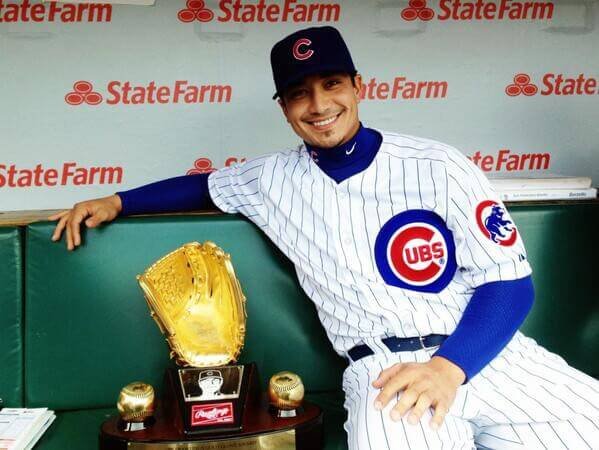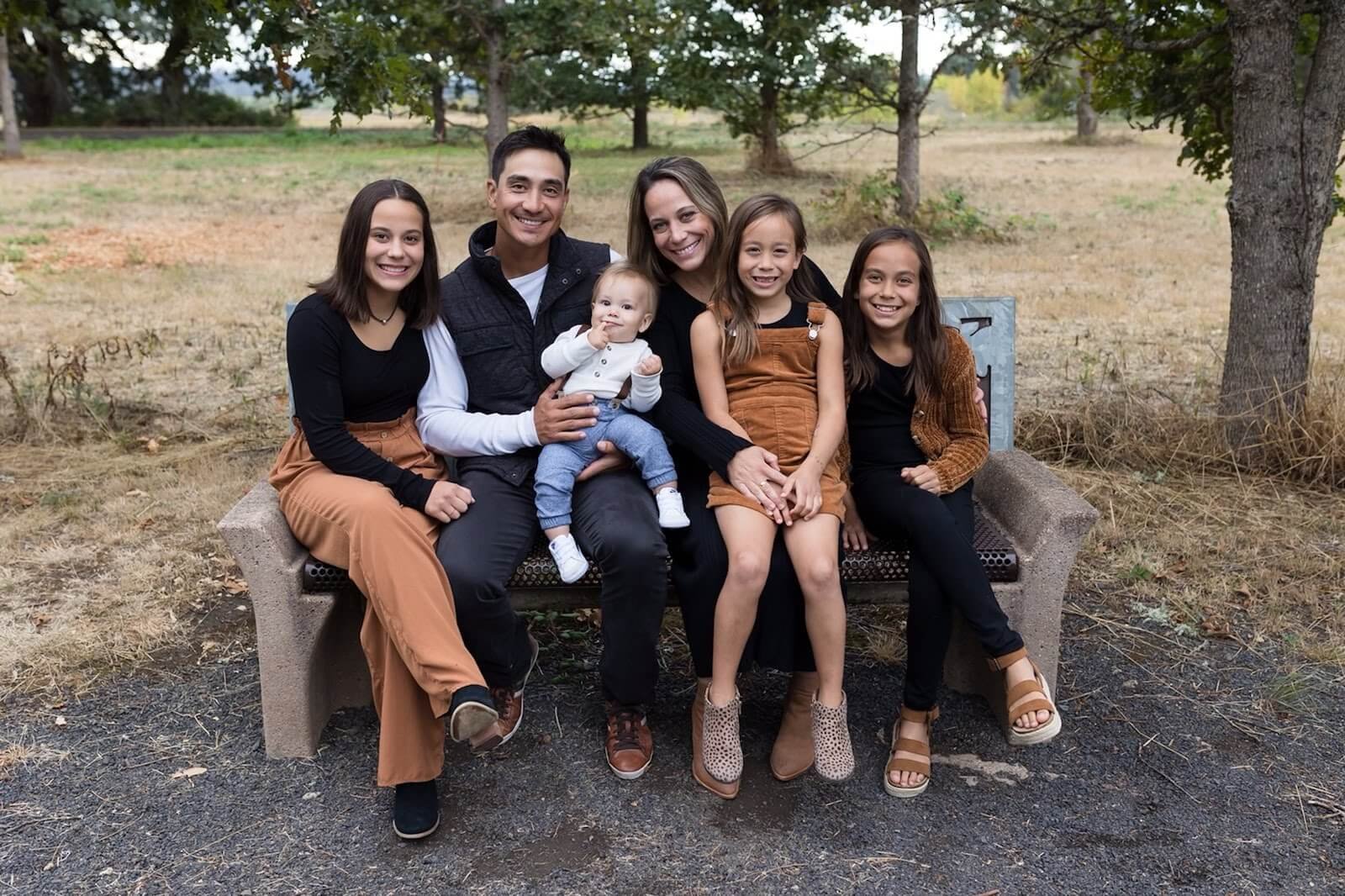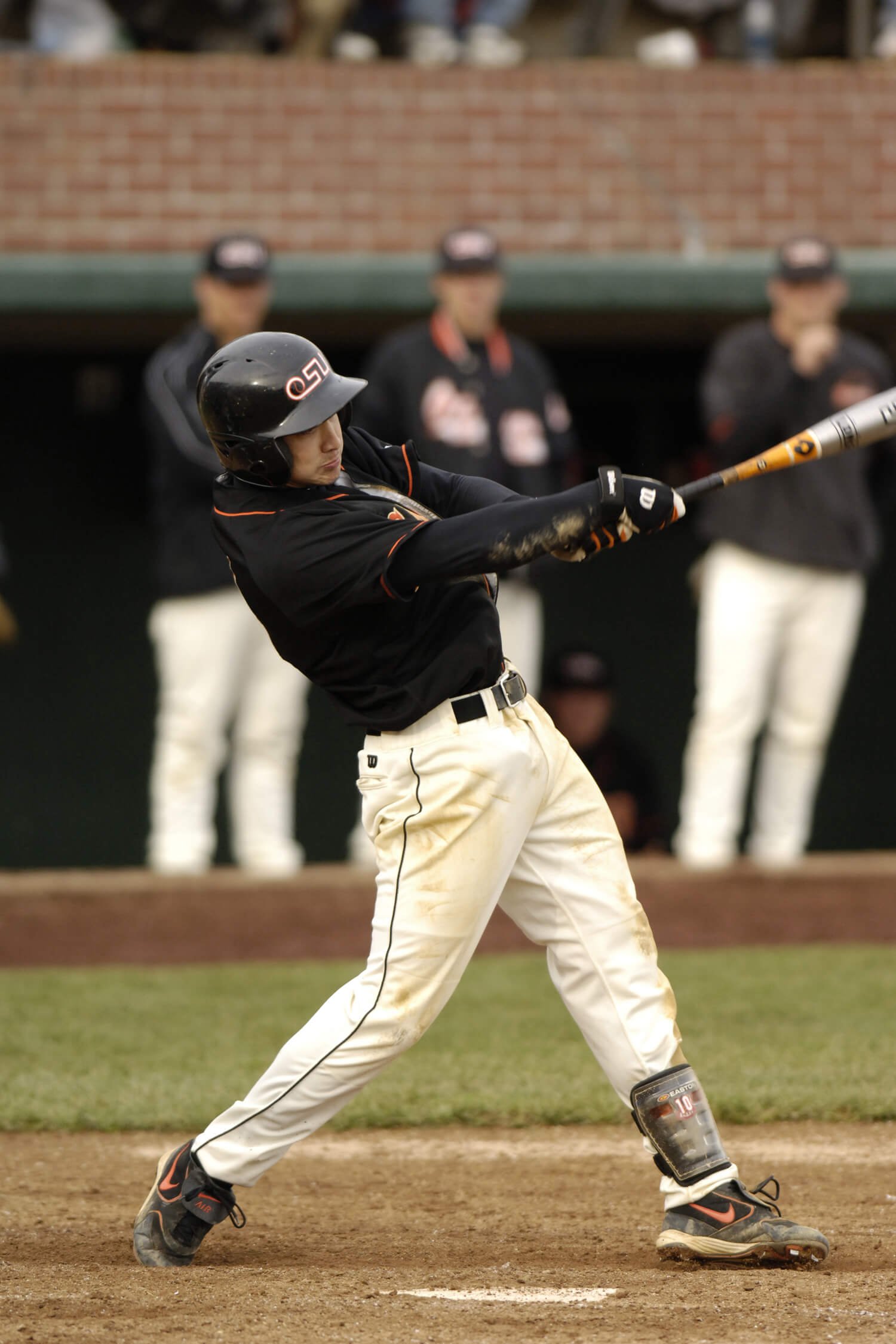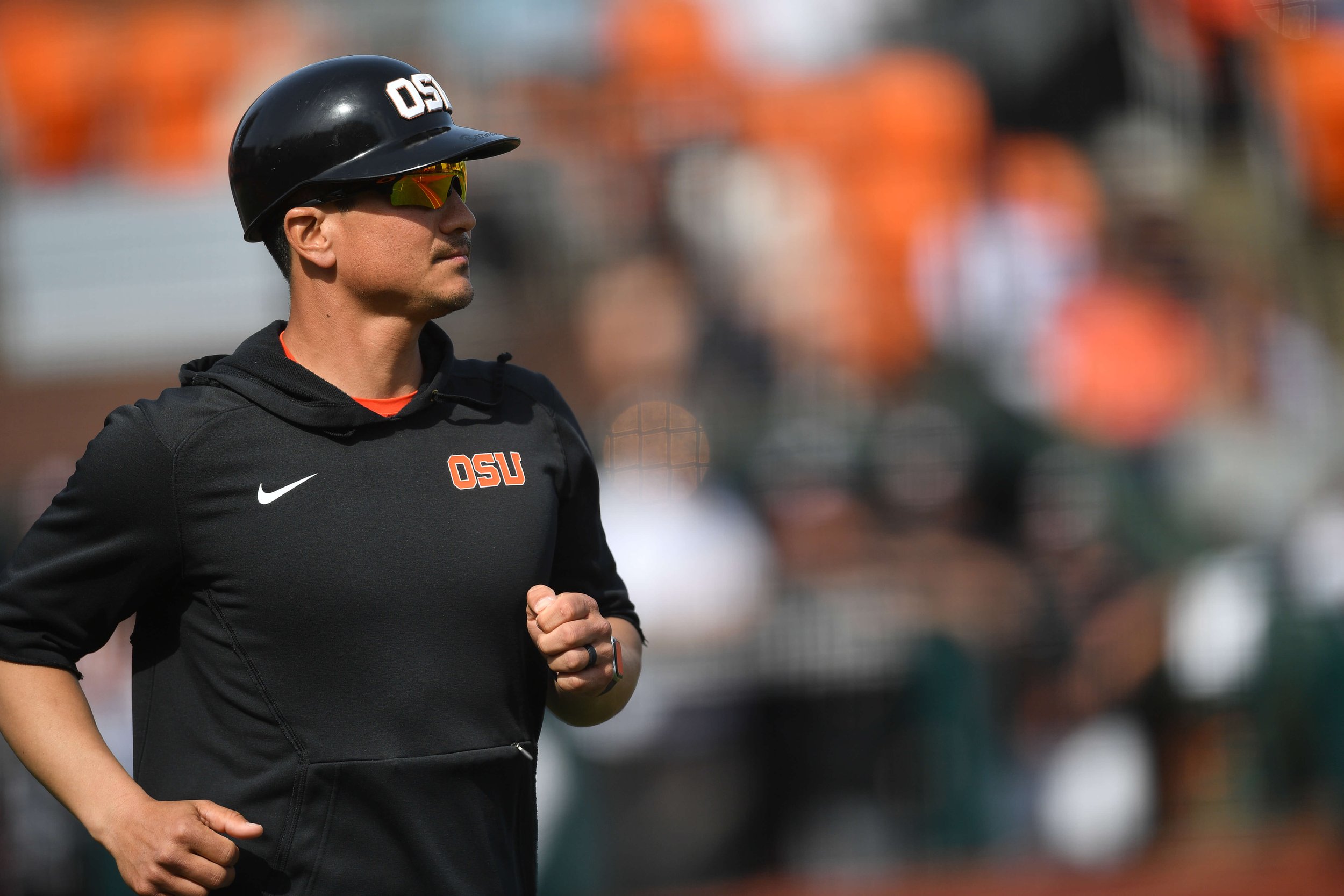Barney chooses Beaver baseball over pros: ’Where your heart is matters’
Darwin Barney lives in Lake Oswego, but in a larger scope, he is a resident of Beaver Nation.
That’s why one of the greatest names in Oregon State baseball annals has set professional baseball plans aside — at least temporarily — to further the good of his alma mater.
The shortstop on OSU’s national championship teams of 2006 and ’07 is in his second season as assistant coach for the Beavers (32-8 overall, 13-5 Pac-12), who lead the conference and are ranked No. 2 nationally.
In 2020, Barney left his position as manager of the Nashville Sounds — Triple-A affiliate of the Texas Rangers — to join former teammate Mitch Canham’s staff in Corvallis.
“I love it,” says Barney, 36. “One thing I learned going into pro ball, where your heart is matters. I dealt with a little of that with the Ranger organization. I didn’t have roots there. There wasn’t the same passion that I had when I got here. It makes this job easy. This is a part of me.”
The average Beaver fan might not understand the sacrifice Barney has made to work alongside the man who helped him win a pair of College World Series titles. He commutes to Corvallis from the Lake Oswego home he shares with wife Lindsay and their four children — daughters Hayden, 13; Zoey, 10, and Devyn, 7, and son Noah, 16 months. Sometimes, especially on weekends during which the Beavers have a night game followed by a day game, he’ll spend a night at the home of Canham or fellow OSU assistant Ryan Gipson, or grab a hotel room. More often, he drives back to spend a few extra hours with his family.
The Barney clan: From left, Hayden, Darwin, Noah, Lindsay, Devyn and Zoey (courtesy Barney family)
“That’s 2 1/2 hours a day on the road,” Barney says. “It’s 40 hours a month, maybe more, in the fall. That’s the toughest time of the year, even though you’re on a consistent schedule. It’s a lot of hours to spend in the car. It’s taking time away from your family, from the driving range, from anything else I like to do in my life. “But I read a million books on audio, a bunch of (audio) series. Sometimes Hayden and Zoey read the same book, so we have something to do together. I really don’t mind it. I enjoy being here. I enjoy what I do. There are not a lot of jobs out there where I’d be as happy as I am here.”
Officially, Barney is a “volunteer” assistant on the Beavers’ staff. NCAA regulations limit each staff to only two paid assistants. A bid to allow programs to add of a third paid assistant has stalled during COVID times, leaving Gipson and pitching coach Rich Dorman as the paid coaches under Canham. Barney is compensated through funds raised in camps, golf tournaments and donor activities.
Volunteer assistants aren’t allowed to go on the road to recruit, but other than that, Barney has as many responsibilities as Gipson and Dorman. Barney serves as the first base coach, works with the infield defense and shares time with Gipson working with hitters.
“Players don’t consider me a ‘volley,’ ” Barney says. “We do our thing here. I just get paid differently. Getting to do something I love is worth it to me.”
When I relay Barney’s “volley” comment to Canham, he chuckles.
“The players all respect the heck out of him,” Canham says. “He’s a stud, man. He is doing what he has always done — helping the guys with their attitude and confidence.
“Darwin is a guy who exudes a ton of confidence and works extremely hard. It rubs off on the guys. He’s been a great clubhouse and dugout guy. The way he communicates with guys helps them feel comfortable and confident.”
► ◄
Darwin is Oregon State’s career leader with 238 hits during his three seasons with the Beavers (courtesy OSU sports information)
Barney, undersized but talented and super competitive, went straight from Southridge High to starting shortstop and lead-off hitter for the Beavers as a freshman under Pat Casey in 2005. The next three years were the greatest era in Oregon State baseball history — three straight CWS appearances capped by back-to-back championships.
The 5-9, 170-pound Barney was a slick fielder who hit .311 in 191 games — never missing a game in his career — while collecting a school-record 238 hits in the process. He was Pac-10 Freshman of the Year, first-team Freshman All-American and All-Pac-10 in 2005, All-Pac-10 again in 2006 and an All-CWS Tournament team selection in 2007.
Chosen by the Chicago Cubs in the fourth round of the 2007, Barney moved quickly up the ladder. He was seventh in National League Rookie of the Year voting in 2011, hitting a career-high .276 in 143 games with the Cubs. The next year he was the NL Gold Glove winner at second base, committing two errors in 731 chances and matching the major league record for errorless games with 141 that season. Barney retired after playing eight big-league seasons with the Cubs, Los Angeles Dodgers and Toronto from 2010-17.
Barney had signed on as manager of the Triple-A Sounds in 2020, but in April, COVID caused cancellation of the season for all of professional baseball. Barney returned to Lake Oswego to work remotely as he began preparations for the 2021 season, all the while wondering if this was what he was meant to do.
“I’ve always had aspirations to manage in the big leagues,” he says. “That’s where I was headed, but my first experience in pro ball was a little different than I thought it was going to be.
“Minor league baseball is driven and run by a majority of people who haven’t played a ton of ball at the major league level. It’s based a lot on analytics and how can we apply it, which is fine. We do a lot of that here, too.
But it was really hard trying to work from home and having repetitive Zoom calls (with Rangers officials).”
Then an old friend called, and everything changed.
► ◄
The catcher and captain for the Oregon State teams from 2005-07 was Canham, who came to OSU a year ahead of Barney and redshirted his first season. After his junior year in eligibility, Canham was chosen by St. Louis in the 41st round of the 2006 draft.
“Part of the reason I decided to stay for my senior year was I got to play with Darwin for another year,” Canham says.
It was a great move by Canham, who helped engineer another national championship, then went to San Diego in the supplemental round after the first round, the 57th pick overall, of the 2007 draft. Canham, however, never made it to the majors. He toiled nine seasons in the minor leagues, rising four times to Triple-A but playing only 41 games at that level before retiring as a player in 2015 at age 30.
Canham then began a managing career in the Mariners organization, starting at Single-A Clinton in 2015 and ending at Double-A Arkansas in 2018. All the while, through the years, he had kept in touch with Barney.
“We’ve always been real close, back to when we were teammates,” Canham says. “We’ve always had a great relationship.”
After COVID scrubbed most of Canham’s first season at the OSU helm, he called Barney at his Lake Oswego home.
“It was a conversation about where I’m at, how’s everything going,” Barney recalls. “And then, that there was a job opening, and what would I think about applying? That conversation was pretty simple. It was, ‘Hmmm, let me talk to my wife.’ She wasn’t all the way in at first with that big of a change. But she knows the connection and loves it here, too.”
Lindsay was Darwin’s first (and only) girlfriend at age 12. They went to Southridge and Oregon State together. “Best friends our whole lives,” he says. “We grew up together.”
And after three wonderful daughters, Lindsay finally gave Darwin a son. Careful what you wish for.
“Boys are a little more difficult,” he says. “They’re crazy at that age. He never stops moving.”
Barney calls his return to the college game “a no-brainer for me.”
“College is different (than the pros),” he says. “You’re shaping these guys lives more than just shaping baseball. Navigating all of that has been a good learning curve for me. Plus, everyone on this staff has a connection here. Who wouldn’t want to be a part of that? I gave it a go; I’m really happy I did.
“It’s funny how it all works out. Since 2007, Mitch and I had been talking about coming back and coaching here together. This is a place where we feel like it’s our baby. We care about it almost as much as we do our kids.”
Dorman’s connection is a season as pitching coach under manager Canham at Clinton. Gipson was a teammate of Canham and Barney at OSU in 2005 and ’06, a scrappy infielder who hit .330 and led the Beavers in on-base percentage his first season. Undergrad aides Richie Macarena’s and Jake Postlewait are former OSU players, as are Ryan Gorton, the team’s director of operations, and Braden Wells, director of student-athlete development.
Nobody has the pedigree as a player, of course, as does Barney, though he doesn’t flaunt it.
“They call us the ‘yin’ and ‘yang,’ ” Canham says. “He’s the nice one; I’m the ornery one. Good cop, bad cop.We see things very differently because of the way we are, but we make it blend very well.”
How are they different?
“How I approach some (players), how I talk to guys,” Canham says. “Darwin has a little more of a lovey touch to him. I’m a little more up front. I’m extremely transparent. He has a good feel for timing of a message, with the tone of his voice in delivering some of his stuff. We both make it work. We respect the heck out of each other, love working with each other.
“That’s what I love about working here. Each guy has something very special to him. Darwin is a huge competitor, all about mentality and conviction. Gip is gritty as all get-up and is going to do anything and everything to help the guys win. He showed that as a player. Rich is a warrior. He has a tough mentality and a care factor that goes through the roof.”
With Barney, there is an additional factor. Only a decade removes him from the Rawling Gold Glove Award he has in his study at home. Barney could probably step right into a major league lineup and not be out of place defensively.
“He takes ground balls with the guys,” Canham says. “It’s not like he just knows how to teach it. He can still go out and do it.”
► ◄
Barney has served as the Beavers’ first-base coach along with other duties the past two years (courtesy OSU sports information)
While Gipson is technically called the Beavers’ “hitting coach,” the duty is shared.
“Gip runs the offense,” Barney says. “Every once in awhile Mitch will give him signs, but for the most part, Gip runs the offense. We’re out there doing our thing. If it’s a hit-and-run in the second inning, it’s not from Mitch, it’s from Gip. On the hitting side, Gip handles the organizational stuff. We’re a two-headed monster when it comes to working with guys on the infield and hitting sides.
“That’s another difference between college and pro ball. There’s more ego (in the pros). (Players) want to you to stay in your lane. With coaches, if your name is next to a guy who hits well, maybe you get moved up. We don’t work that way (at Oregon State). We all speak the same language. If (outfielder) Justin Boyd has a question, he might text me one day and Gip the next. Our feelings aren’t hurt. We all want the guys to be successful. We exchange ideas because we want to make sure we have the same message, but we don’t care who works with the guy.”
Freshman Travis Bazzana — an Australian who was MVP of the West Coast League last summer playing for the Corvallis Knights — is under Barney’s auspices as a second baseman.
“Earlier this season, I felt like Bazzana needed a little firmer voice,” Barney says. “I turned him over to Gip for two days. I’m not afraid to let anybody else help with the infield defense. Gip’s not afraid to let me take on a few hitters. We’re up on the cage together. The collaboration is really healthy. There’s no whispering. It’s very open. It makes it a healthy work environment for the players and coaches.
“And there is definitely not a better boss to work under Mitch. He’ll talk to me a little situational stuff and, ‘What do you think about this?’ But when it comes to how I prepare, how I develop players, he lets coaches do their thing. It makes you feel empowered and important. It lets you do your job well.”
Barney senses big things out of this year’s Beavers.
“This team is pretty special,” he says. “To be where we are through the injuries we’ve had its incredible. It speaks to the strength and depth of our position player core. It also speaks to the strength of Cooper Hjerpe.”
Hjerpe, a sophomore left-hander from Capay, Calif., is 8-0 with a 2.08 ERA and a .179 opponents’ batting average. He has allowed 39 hits with 13 walks and 100 strikeouts (second in the nation) in 60 2/3 innings, making him a top candidate to earn the national Pitcher of the Year Award that OSU’s Luke Heimlich won in 2018.
“Having a real Friday night guy who gets hitters off balance for the whole weekend helps us and carries over to our other pitchers.” Barney says. “We haven’t caught many breaks on the injury front, but we’re starting to get healthier. This has all the makings of a team that can make a run. The offense has clicked well. We have to continue to get better, stay healthy, and pitch and defend. That’s what we do here at Oregon State.”
I ask if Barney sees any comparisons with the 2022 Beavers and the teams on which he played in ’06 and ’07.
“The biggest thing that relates is athleticism,” he says. “This team is super athletic defensively. I thought our teams were pretty good defensively, but last year was the best defense we’ve ever had, and this year we’re beating that.
“The biggest thing is dealing with expectations. This team loves expectations. This team is easy to coach. You can hold (players) to a high standard. They understand what we’re trying to do here. If it’s not genuine and you’re not really playing for a national championship, it’s hard to hold them to a standard. They know what our goal. It enables us as coaches to demand high-level play.’
► ◄
Barney has service time of nearly seven years at the major-league level. He would need to coach in the majors for three or four years to qualify for a full MLB pension.
“I’d love to get that done some day,” he says. “Could be 10 years from now, or never. It would just add a lot of security for our family.”
Barney is an investor in the Portland Diamond Project and acted as “chief baseball advisor” for the movement to bring the MLB to Portland before signing on at Oregon State.
“A dream of mine has to been to coach for a Portland team (in the majors),” he says. “It would take something like that or a major league job (for him to leave OSU).
“But I’m really enjoying my time here. We’re a good group. We’re set up to be a really good team for a long time. I’m just trying to stay in the moment and not think about the future too much.”
Canham understands the financial aspects of Barney’s situation.
“We’re going to do everything we can to take care of him on that aspect,” Canham says. “He loves it here. He has always loved it here. He wants to be here as long as possible. The excitement he brings to the yard every day pushes out toward everyone else. Bottom line is, we need him here.”
► ◄
Readers: what are your thoughts? I would love to hear them in the comments below. On the comments entry screen, only your name is required, your email address and website are optional, and may be left blank.
Follow me on Twitter.
Like me on Facebook.
Find me on Instagram.
Be sure to sign up for my emails.



